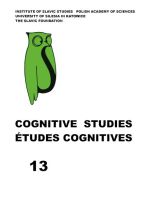Forms of Address and Their Meaning In Contrast in Polish and Russian Languages
Forms of Address and Their Meaning In Contrast in Polish and Russian Languages
Author(s): Wojciech Paweł SosnowskiSubject(s): Language and Literature Studies
Published by: Instytut Slawistyki Polskiej Akademii Nauk
Keywords: forms of address; language politeness; language rudeness; act of speech; bilingual dictionary; parallel corpora; classifiers of politeness; print dic-tionary; computer dictionary.
Summary/Abstract: Many studies in contemporary linguistics focus on investigating politeness and rudeness in language. This paper, however, has not been intended as a contrastive study of the phenomena in question. Language politeness and rudeness are con- veyed by means of expressions of politeness and rudeness which are perceived as entrenched and recurring in specific situations. These expressions convey the expected meaning of politeness and rudeness accepted in the model of social behaviour. If one uses the explicative method such expressions could be reduced to the following formula ‘I inform you that I follow a verbal conduct defined as polite’. Owing to the emergence of parallel corpora of particular languages, it is nowadays easier to collect data for research on forms of address as well as on expressions of politeness in the first half of the 21st century. Investigating the meaning of forms of address, which are part of linguistic repertoire used to express politeness and rudeness should be regarded as an interesting area of research. It is the consequence of the increasing importance of intercultural communication, expansion of international cooperation, and formation of new standards of interpersonal communication aimed at achieving mutual understanding without resorting to violence. It is worth mentioning that currently there are no bilingual dictionaries which would include practical rules for using forms of address. Moreover, dictionaries (especially bilingual ones) also do not list classifiers of politeness, which becomes a shortcoming as regards the purposes of translation and teaching foreign languages. The aforementioned problems apply to print as well as computer dictionaries. A reliable list of forms of address and their meaning may become helpful in intercultural communication. It would be also important to create a Contemporary Dictionary of Expressions of Politeness and Rudeness in a paper as well as a computer version.
Journal: Cognitive Studies | Études cognitives
- Issue Year: 2013
- Issue No: 13
- Page Range: 225-235
- Page Count: 11
- Language: English

